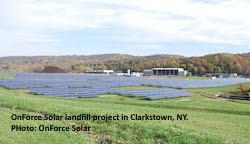 Virent and the PlantPET Technology Collaborative (PTC) announced that the parties have signed an Expression of Interest that provides individual members of the PTC an option on preferred access to Virent’s 100% plant-based BioFormPX paraxylene (PX) to be produced at the company’s first industrial manufacturing facility. The plant-based PX, when combined with existing PET technology, allows manufacturers to offer customers 100% renewable, recyclable, PET packaging and polyester fibers.
Virent and the PlantPET Technology Collaborative (PTC) announced that the parties have signed an Expression of Interest that provides individual members of the PTC an option on preferred access to Virent’s 100% plant-based BioFormPX paraxylene (PX) to be produced at the company’s first industrial manufacturing facility. The plant-based PX, when combined with existing PET technology, allows manufacturers to offer customers 100% renewable, recyclable, PET packaging and polyester fibers.- Agriculture Secretary Tom Vilsack has announced proposed new actions to include new forest products in the BioPreferred program. The proposal also includes other traditional biobased products and other mature market products, which have been produced in innovative ways. USDA seeks public comment for 60 days on the proposed rules published in the Federal Register.
- The Second International Ocean Research Conference will take place November 17-21, 2014 in Barcelona, Spain. The event will give the scientific community an opportunity to take stock of global research and determine a roadmap for the years to come. The purpose of the event is also to help secure recognition for the important role of the ocean in the international political agenda. Close to 600 scientists from more than 70 countries are scheduled to take part in the conference which is co-organized by UNESCO’s Intergovernmental Oceanographic Commission (COI), Fundació Navegació Oceànica Barcelona (Spain) and the Oceanography Society (USA).
- CBD Energy Limited has announced that it has fully erected 6 wind turbines on its Taralga Wind Farm site in New South Wales, Australia, with a further 17 nearing completion. When construction is complete, the Taralga Wind Farm will have 51 operating wind turbines. The initial generation from constructed wind turbines is planned for December 2014. When completed, the approximately US$265 million project is forecasted to generate on average US$25 million of revenues each year for its investors. The project’s off-take customer is Energy Australia, one of Australia’s largest utilities.
OnForce Solar Completes Solar Landfill Project
OnForce Solar has completed what the company says is the first of its kind solar landfill project in the state of New York. The 2.364 MW solar array was built on 13 acres of decommissioned, capped landfill in West Nyack for the Town of Clarkstown. The solar farm will generate 2,800,000 kilowatt hours of clean energy per year and is expected to save taxpayers as much as $4M over the lifetime of the system according to OnForce Solar.
 Clarkstown Supervisor Alex Gromack said of the project, “We are very proud to be the first municipality in New York to install a solar field on a capped landfill. Councilman Hoehmann, who first proposed this idea in 2009, town officials, our consultants H2M architects + engineers, and I have been working on this project for several years and we are excited to see it finally come to fruition.”
Clarkstown Supervisor Alex Gromack said of the project, “We are very proud to be the first municipality in New York to install a solar field on a capped landfill. Councilman Hoehmann, who first proposed this idea in 2009, town officials, our consultants H2M architects + engineers, and I have been working on this project for several years and we are excited to see it finally come to fruition.”
The project is owned in full by OnForce Solar. The company invested $6M to install, operate, and maintain the solar installation pursuant to a 20-year Power Purchase Agreement (PPA). Additionally, the town was reimbursed $100,000 by OnForce Solar to cover any out-of-pocket expenses making the project ultimately cost-free for the Clarkstown. The solar system installation was made possible, in part, through support that the Town of Clarkstown received from the New York State Energy Research and Development Authority (NYSERDA) through Governor Cuomo’s NY-Sun initiative.
The solar system integrates Orange and Rockland Utilities’ supervisory control and data acquisition (SCADA) monitoring system that allows the utility to remotely monitor and control the solar system. The SCADA monitoring system, part of the the utility industry’s Smart Grid Pilot Program, adds an enhanced level of resiliency to Orange and Rockland Utilities’ grid, helping to protect the utility’s customers from catastrophic power outages according to OnForce Solar.
“We are very excited to commission the very first PV on landfill project in the state of New York,” added Charles Feit, CEO of OnForce Solar. “Our gratitude goes out to Governor Cuomo, NYSERDA, The Town of Clarkstown and the other stakeholders that came together to make this project a reality. OnForce Solar is honored to have been an integral part of the process and we’re working on many more projects like this one across the state.”
Italy Binds Biofuel Targets
Italy has passed a law that will set the way for national binding targets. The news comes on the heels of talks by the European Union (EU) on what, if any, binding renewable energy targets should be in place. The official degree as published in the “Gazzetta Ufficiale” states that fuel suppliers will be obligated to blend fuel:
- at least 0.6% advanced biofuels in petrol and diesel beginning January 1, 2018;
- 0.8% beginning January 1, 2020; and
- 1% beginning January 1, 2022.
The passage of Italy’s law comes at the same time the European Council released its 2030 Energy and Climate Package where the transportation sector has seen the most positive changes when compared to the first proposal. The law now puts Italy as the lead in Europe on mandating advanced biofuels from waste and residues.
The Italian decree comes six months after the Italian Ministry of Economic Development announced in May the intention to fund the construction of three advanced biofuels  facilities in Southern Italy and is part of the country’s initiatives to boost competitiveness.
facilities in Southern Italy and is part of the country’s initiatives to boost competitiveness.
In the fall of 2013, Novozymes, together with Italian company Biochemtex opened the world’s first commercial-scale advanced biofuels refinery in Italy – using agricultural waste as input. When asked by DomesticFuel what message Italy’s mandate sends to other countries, Novozymes’ Vice President for Biomass Conversion, Sebastian Søderberg answered, “In general, it will send a very positive signal to the other European countries and outside Europe. Italy and a number of other member states have been pushing for a mandate for advanced biofuels at EU level for more than 2 years and Italy’s move will support this process.”Read More
Ethanol Coalition: Auto Engineers Expose EPA’s Oil Bias
 A new paper from automotive engineers shows how the federal government has a bias toward Big Oil. Officials from the American Coalition for Ethanol (ACE) praised a new Society of Automotive Engineers (SAE) paper authored by experts from Ford Motor Company, General Motors Company, and AVL Powertrain Engineering Inc. that concludes that emissions from higher ethanol blends are cleaner than gasoline, and the approach used by the U.S. Environmental Protection Agency (EPA) to estimate exhaust emissions, the Motor Vehicle Emissions Simulator (MOVES) model, is biased in favor of oil.
A new paper from automotive engineers shows how the federal government has a bias toward Big Oil. Officials from the American Coalition for Ethanol (ACE) praised a new Society of Automotive Engineers (SAE) paper authored by experts from Ford Motor Company, General Motors Company, and AVL Powertrain Engineering Inc. that concludes that emissions from higher ethanol blends are cleaner than gasoline, and the approach used by the U.S. Environmental Protection Agency (EPA) to estimate exhaust emissions, the Motor Vehicle Emissions Simulator (MOVES) model, is biased in favor of oil.
“We applaud these Ford, General Motors, and AVL Powertrain engineers for exposing that EPA’s MOVES model is biased in favor of a result oil companies prefer and ignores the way gasoline is blended with ethanol in the real-world,” said [ACE Executive Vice President Brian] Jennings. “This is just the latest example of how Big Oil is twisting EPA’s arm to limit ethanol use. First, it appears EPA is about to completely rewrite the Renewable Fuel Standard to help oil companies avoid their legal responsibility to blend fuels, like E15 and E85, which reduce greenhouse gas emissions. Now, EPA is relying on a biased approach for estimating tailpipe emissions, remarkably making gasoline appear cleaner than ethanol.”Read More
CHS Co-Op to Open Wisc. Propane Rail Terminal
 The nation’s leading farmer-owned cooperative and a leading energy, grains and foods company is opening a new propane rail terminal in Wisconsin. CHS announced the opening of the new terminal in Hixton, just in time to meet demand for the upcoming heating season.
The nation’s leading farmer-owned cooperative and a leading energy, grains and foods company is opening a new propane rail terminal in Wisconsin. CHS announced the opening of the new terminal in Hixton, just in time to meet demand for the upcoming heating season.
The new terminal is owned by CHS and operated by Federation Cooperative of Black River Falls, Wis. Served by the CN railroad, the terminal will initially have 360,000 gallons of storage, the ability to unload six railcars every 4.5 hours, and two truck loading bays capable of loading six trucks per hour. The secure terminal, which uses modern automation and safety technologies, will be completed in mid-November.
“CHS invested in this terminal as part of a broader $24 million investment to develop a robust supply network for propane marketers in the Northern Tier region affected by the Cochin pipeline reversal,” according to Drew Combs, CHS vice president of propane. “Our goal is to help marketers serve homeowners, farms and businesses with a safe, reliable supply of propane, and to position our customers for future growth while adding value for our member owners,” says Combs.
State officials on hand for the ribbon-cutting ceremony said the new terminal will be a major asset for the state.
Growth Energy Staffer on Advisory Committee
 U.S. Secretary of Commerce Penny Pritzker has appointed Jim Miller, Growth Energy’s Vice President and Chief Economist, to a position on the Department of Commerce’s Renewable Energy and Energy Efficiency Advisory Committee. The departmental committee was established to advise the Secretary on programs and policies to expand U.S. renewable energy and energy efficiency exports.
U.S. Secretary of Commerce Penny Pritzker has appointed Jim Miller, Growth Energy’s Vice President and Chief Economist, to a position on the Department of Commerce’s Renewable Energy and Energy Efficiency Advisory Committee. The departmental committee was established to advise the Secretary on programs and policies to expand U.S. renewable energy and energy efficiency exports.
“This is a wonderful opportunity to help increase awareness of the importance of renewable fuels as well as expand markets across the globe to help export clean, sustainable energy that will help create jobs right here at home, while improving the environment around the globe and reducing the world’s dependence on fossil fuels,” said Miller.
Miller previously served as the Senior Policy Advisor on the Budget Committee under Senator Kent Conrad (D-N.D.). Prior to his service on Capitol Hill, Miller was appointed by President Obama and confirmed by the U.S. Senate to serve as the Under Secretary for Farm and Foreign Agriculture Services at the U.S. Department of Agriculture.
Also appointed to the committee was Kelly Davis of the Renewable Fuels Association.
DuPont to Sit on RFA Board
 DuPont will now be sitting on the governing board of the Renewable Fuels Association (RFA). The company has been an associate RFA member for more than 10 years and has now upgraded its membership as its first cellulosic ethanol plant is in its final stages of construction. The biorefinery will be co-located next to Lincolnway Energy in Nevada, Iowa and when complete will produce 30 million gallons per year of ethanol using corn ag waste.
DuPont will now be sitting on the governing board of the Renewable Fuels Association (RFA). The company has been an associate RFA member for more than 10 years and has now upgraded its membership as its first cellulosic ethanol plant is in its final stages of construction. The biorefinery will be co-located next to Lincolnway Energy in Nevada, Iowa and when complete will produce 30 million gallons per year of ethanol using corn ag waste.
“Next generation cellulosic ethanol is emerging on the market and DuPont is at the forefront of innovation. Their knowledge and expertise in all aspects of the biofuels industry make them a valuable addition to the Renewable Fuels Association,” said Bob Dinneen, president and CEO of the RFA. “I am eager to work together to advance the renewable fuels industry, which is already directly and indirectly employing nearly 400,000 people, reducing GHG emissions, and lowering America’s foreign oil dependence.”
William Feehery, president of DuPont Industrial Biosciences said of their renewed commitment to the ethanol association, “RFA is a leading voice in Washington on issues related to our industry and we look forward to working even more closely together as we reach full cellulosi c production in the coming year. We acknowledge the hard work RFA has done to promote and defend the Renewable Fuel Standard (RFS) both as an individual organization and as our partner in the Fuels America Coalition. A stable RFS is vitally important to support growth for the existing corn ethanol industry while garnering the investment needed to expand and grow cellulosic ethanol in the United States. We must keep the technology, research, and development here in the United States so consumers can continue to have choices at the pump and America can reduce its reliance on foreign oil.”
c production in the coming year. We acknowledge the hard work RFA has done to promote and defend the Renewable Fuel Standard (RFS) both as an individual organization and as our partner in the Fuels America Coalition. A stable RFS is vitally important to support growth for the existing corn ethanol industry while garnering the investment needed to expand and grow cellulosic ethanol in the United States. We must keep the technology, research, and development here in the United States so consumers can continue to have choices at the pump and America can reduce its reliance on foreign oil.”
RFA’s Davis Appointed to Advisory Committee
 Renewable Fuels Association (RFA) Director of Regulatory Affairs Kelly Davis has been appointed to the Department of Commerce’s Renewable Energy and Energy Efficiency Advisory Committee.
Renewable Fuels Association (RFA) Director of Regulatory Affairs Kelly Davis has been appointed to the Department of Commerce’s Renewable Energy and Energy Efficiency Advisory Committee.
According to Secretary of Commerce Penny Pritzker, the function of the committee is to “provide consensus advice on the development and administration of programs and policies to expand U.S. renewable energy and energy efficiency exports.”
“It is truly an honor to be selected by Secretary Pritzker to serve on the Renewable Energy and Energy Efficiency Advisory Committee,” said Davis. “I look forward to having a seat at the table and helping Secretary Pritzker ensure that our global trading partners understand and appreciate the benefits of U.S. produced ethanol in reducing consumer gasoline prices, improving energy diversity and security, and addressing climate change.”
Davis recently participated in a trade mission to China, led by USDA Under Secretary Michael Scuse, to promote U.S. ethanol and co-products and strengthen the trade relationship between the two countries. Last year, she joined a similar trade mission, led by the U.S. Grains Council, to South Korea and Japan. The RFA board of directors has made opening new markets for ethanol and distillers dried grains with solubles (DDGS) abroad a top priority, and Davis’ appointment to this prestigious advisory committee reflects that commitment.
API: Extend Domestic Fuel Supply To Lower Gas Prices
In a recent blog post authored by Geoff Cooper, senior vice president of the Renewable Fuels Association (RFA), the American Petroleum Institute (API) recently released a study that argues that the fracking boom has led to dramatically lower prices for crude oil and refined products between 2008-2013. Cooper wrote that the study suggests that increased  domestic production of crude oil, natural gas liquids (NGLs) and lease condensate from fracking has already extended U.S. supplies and helped to lower gas prices.
domestic production of crude oil, natural gas liquids (NGLs) and lease condensate from fracking has already extended U.S. supplies and helped to lower gas prices.
The study finds that every 1 million barrels/day of new supply reduces consumer prices for petroleum products between $0.06-0.20 per gallon. Cooper writes that according to economics more supply generally results in lower prices, in this case there are two problems with API’s rationale.
- Problem 1: Global demand for petroleum products continues to grow faster than global supply. EIA data show global production of crude oil, NGLs and condensate grew by 4.1 million barrels/day between 2008 and 2013. But global consumption of those products ramped up by 5.4 million barrels/day over the same period. Thus, demand gains outstripped supply gains by more than 30%.
- Problem 2: When energy economist Phil Verleger and researchers at Louisiana State University, Iowa State University, University of Wisconsin, the Department of Energy, and others separately showed that extending the U.S. gasoline supply with ethanol leads to lower pump prices, Big Oil defiantly screamed “NOT SO!” Verleger found that consumer paid $0.50-$1.50 per gallon less for gasoline in 2013 because of ethanol’s extension of the fuel supply. His conclusion corroborated results from Iowa State/University of Wisconsin that showed consumers saved up to $1.09 in 2012 due to ethanol’s aggregate effect on gasoline supplies.
Cooper ends his article by asking the question, “So, which is it API? Does adding volume to the fuel supply reduce prices, or doesn’t it?”
Veterans Asset Offering Vets Online Solar Education
 The Veteran Asset (TVA) is now offering solar PV scholarships for U.S. military veterans through its new 32-hour online training program. The training program is being offered in conjunction with Ambassador Energy Solar College, an Interstate Renewable Energy Council (IREC) accredited training program.
The Veteran Asset (TVA) is now offering solar PV scholarships for U.S. military veterans through its new 32-hour online training program. The training program is being offered in conjunction with Ambassador Energy Solar College, an Interstate Renewable Energy Council (IREC) accredited training program.
The organization has been providing free solar PV training for vets since May 2014 via a traditional “brick and motar” option at their Ambassador Energy’s training facility in Murrieta, California. The entry level Solar PV Design and Installation is a five-day course with an exam following the completion of the courses. This course is now offered online.
The program is also customized to allow renewable energy company’s to leverage TVA’s specialized vetting process and their program, to help companies hire veteran graduates. Courses can be co-branded to the company, its technologies and geographies it serves.
Kelly Smith, TVA vice president said of the new online program, “The online option not only provides TVA data for determining the next locations for our ‘Brick and Mortar’ training centers but it is also a scalable way for us to cast a wide net, helping us reach as many veterans as possible during this solar ‘gold rush’. We are using technology to help bridge the gap between the desirable supply of a trained veteran workforce and the growing demand from the renewable energy industry. TVA’s entire mission is getting these great folks to work.”

